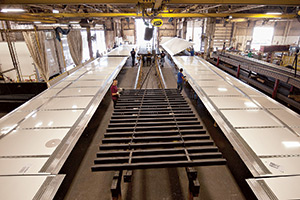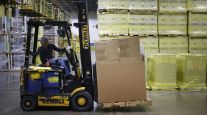March Trailer Orders Drop, but Large Backlogs Remain

This story appears in the May 4 print edition of Transport Topics.
March orders for new trailers fell 22% from a year earlier, but manufacturers remain busy with a heavy backlog generated by an “epic” order season over the past several months, ACT Research said.
Trailer makers received 23,187 net orders in March, down from 29,618 in March 2014 but up 12% from 20,624 in February, ACT reported. In the first quarter, trailer orders totaled 73,703 units, down 13% from the same timeframe in 2014.
Orders have decreased from year-earlier levels for two months in a row, but ACT analyst Frank Maly said the declines reflect a “pull-forward” in order volumes, rather than a weakening of demand.
He said large fleets placed their orders earlier than usual to secure ideal timing for delivery, leading to a spike in demand in late 2014 that helped make that year the industry’s best ever for orders.
As a result, industry backlogs are “pushing Thanksgiving at this point,” Maly said.
“Emphasis now shifts to production as [manufacturers] move to deliver on those record-setting order commitments,” he said.
Meanwhile, FTR pegged March trailer orders at 22,000 units, down 25% from a year earlier but up 7% from February.
“Orders remain subdued, but when you consider how many orders have been placed in the last 12 months and that backlogs are near record levels, this market has tremendous strength,” FTR Vice President Don Ake said.
Wabash National Corp.’s order backlog expanded during the first quarter to a record $1.2 billion, representing about eight months of production, CEO Dick Giromini said on the company’s April 28 earnings call.
“With the most manufacturers’ and supplier slots all but filled for the current year, it is understandable and expected that overall industry monthly order levels will likely continue to be lower on a year-over-year basis until we get to midyear,” Giromini said.
Wabash said first-quarter net income rose to $10.5 million, or 15 cents per share, from $7.3 million, or 10 cents, a year ago. Revenue surged 22% to $438 million, a first-quarter record for the company.
The manufacturer shipped 14,350 new trailers during the quarter, up from 9,900 a year ago and surpassing its guidance of 12,000 to 13,000 units as customer pickups accelerated in the back half of the quarter.
Giromini predicted that demand for new trailers will continue to be strong on high freight levels. “Excessive” fleet age and regulatory compliance requirements also will support demand, he said.
Wabash said it expects to ship between 62,000 and 66,000 trailers this year, up from 57,350 in 2014.
Chris Hammond, a vice president at Great Dane Trailers, said business continues to be strong, and several fleets and dealers are inquiring about 2016 production.
“It’s full steam ahead for the foreseeable future,” he said. “We continue to increase capacity where we can. Fortunately, our suppliers have done a good job, so we’ve had minimal disruption.”
Larry Roland, marketing director at Utility Trailer Manufacturing Co., said orders remain steady.
“We are continuing to ramp up production in several plants to help meet the demand,” he said, adding that materials and supplies continue to keep up with the company’s current build rates.
Hyundai Translead also has added manufacturing capacity, but lead times have been “stretched considerably in a few cases” because of supply constraints, said Glenn Harney, the company’s chief sales officer.
“With production sold out for 2015, there is no longer the same sense of urgency to get orders placed,” he added. “In fact, we have customers placing conditional orders for 2016, but we do not enter them because they are subject to prices getting firmed up later in the year.”
David Giesen, vice president of sales and marketing at Stoughton Trailers, said order levels in February and March were “back into normal ranges, but the company still has a record backlog in terms of quantity and length of time.
“We are continuing to hire to add production while also trying to increase the efficiency of our production lines.” Parts supplies have not been a major problem for Stoughton, he added. “Occasionally, we get a hiccup with something not coming in, but the suppliers are doing a pretty good job of keeping up.”


